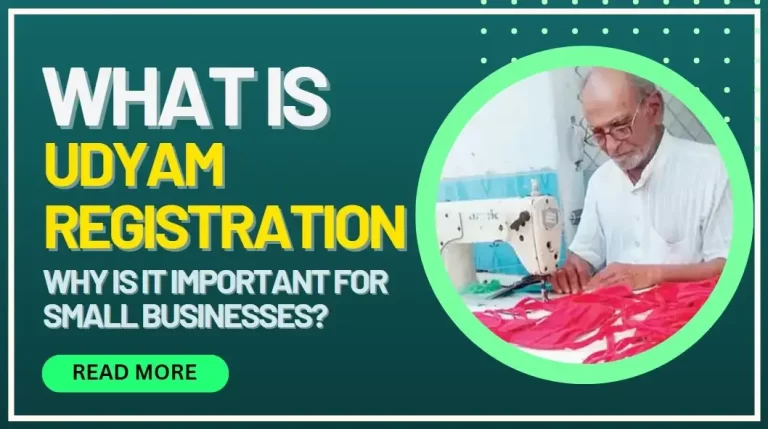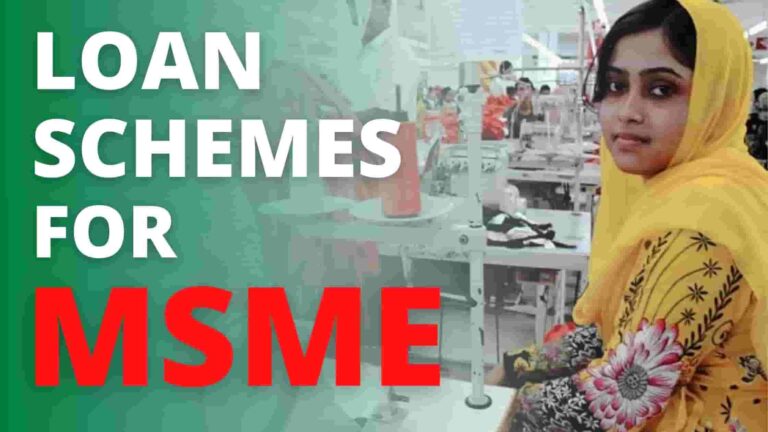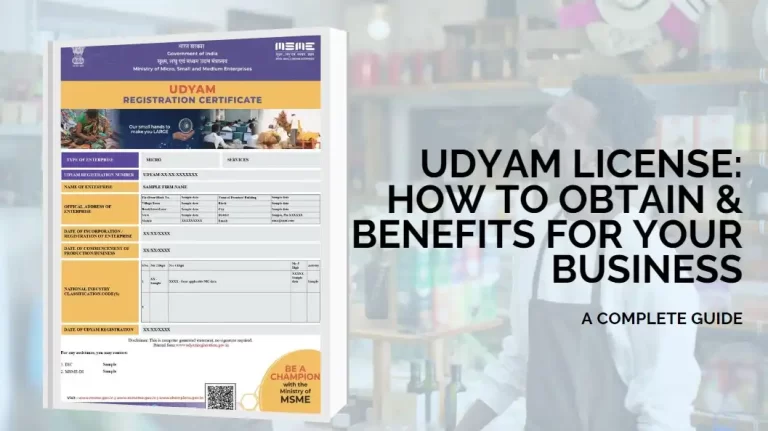Learn about MSME loan scheme and the interest rates available in this post. Also, be aware of the MSME loan registration process.
MSME loan scheme, also known as Micro, Small, and Medium Enterprise Loan Scheme, are forms of loans procedure available to small business owners, traders and entrepreneurs. This form of loan provides you with working capital that you can utilise for a variety of things, including buying new goods, purchasing new equipment, paying your employees’ salaries, and expanding your firm. MSME loans are available from a range of lenders in India. The rate of interest varies from one bank to the next.
A msme business loan is a type of financial scheme designed exclusively for small medium business enterprises use. Business owners, self-employed professionals, MSMEs, and other business entities can apply for business msme loan subsidy from banks and NBFCs. The loan proceeds are mostly used to fund business expansion, fulfil working capital needs, improve cash flow, purchase equipment/machinery, stock inventory, pay rent, hire/train employees, and so on.
Financial institutions offer working capital loans, letters of credit, overdrafts, term loans, cash credits, equipment finance, point-of-sale loans, bill discounting, government-sponsored loans, and bank guarantees.
Private and public sector banks, NBFCs, Small Finance Banks (SFBs), Micro Finance Institutions (MFIs), Regional Rural Banks (RRBs), and other institutions provide business msme loan subsidy.
There is no minimum loan amount, and the maximum unsecured loan amount is Rs. 75 lakh with a payback term of up to 5 years. The loan amount and repayment period may be in excess of the company’s needs.
Banks/NBFCs will base their interest rate on the applicant’s creditworthiness, financial stability, credit history, repayment capabilities, business term, and a variety of other variables.
MSME Loan Scheme Details
| Interest Rate | 7.65% p.a. onwards |
| Loan Amount | Rs.50,000 onwards |
| Loan Tenure | Up to 15 years |
| Processing Fee | Subject to the lender |
MSME has a new definition.
The Government of India changed the definition of MSME on May 13, 2020, and notified it. The new MSME definition is as follows:
Investment has been replaced with Investment and Annual Turnover as the MSME classification requirement.
The Indian government recently enhanced the investment limit for MSME classification. As a result, more businesses and firms will be able to benefit from MSME programmes.
The criteria for classifying MSMEs have now been made standard for Manufacturing and Services Enterprises, as shown in the table below:
| Classification | Micro | Small | Medium |
| Manufacturing and Services Enterprises | Investment does not exceed INR 1 Crore and Turnover does not exceed INR 5 Crore | Investment does not exceed INR10 Crore and Turnover does not exceed INR 50 Crore | Investment does not exceed INR 20 Crore and Turnover does not exceed INR100 Crore |
Micro, Small, and Medium Enterprises (MSMEs) can apply for MSME loans to expand their existing operated small business or start new business.
MSME loans have interest rates that start at 7.65% per annum. The loan amount approved can be as low as Rs.50,000 and as high as a few crores. Depending on the loan amount authorised, the loan repayment duration could last up to 15 years.
Top Banks’ MSME Loan Interest Rates in 2023
| Bank Name | Interest rate |
| Allahabad Bank | At the discretion of the bank |
| Oriental Bank of Commerce | 10.70% p.a. onwards |
| Andhra Bank | At the discretion of the bank |
| ICICI Bank | 13% p.a. onwards |
| Central Bank of India | 11.25% p.a. onwards |
| Indian Bank | 9.75% p.a. onwards |
| Punjab and Sind Bank | 9.95% p.a. onwards |
| Punjab National Bank | At the discretion of the bank |
| State Bank of India | 7.65% p.a. onwards |
| Syndicate Bank | At the discretion of the bank |
| UCO Bank | 8.85% p.a. onwards |
| Union Bank of India | At the discretion of the bank |
| United Bank of India | 10.25% – 16.25% p.a. |
Top Banks offering MSME Loans in India
In India, there are a number of well-known banks that provide loans to small and medium-sized businesses. Some of India’s most well-known banks that provide MSME loans are listed below:
| SME Loans from SBI | |
| Interest Rate | 9.65% p.a. onwards |
| Processing Fee | Up to 2% of the loan amount |
| Loan Amount | Depending on the scheme |
| Loan Repayment Tenure | Up to 120 months |
| SME Loans from HDFC Bank | |
| Interest Rate | 15.75% p.a. onwards |
| Processing Fee | 0.99% of the loan amount |
| Loan Amount | Up to Rs.50 lakh |
| Loan Repayment Tenure | Up to 48 months |
| ICICI SME Loans | |
| Interest Rate | 13% p.a. onwards |
| Processing Fee | Depending on the scheme |
| Loan Amount | Up to Rs.2 crore |
| Loan Repayment Tenure | Depending on the scheme |
Interest Rates on MSME Loans from the Best NBFCs
In India, a number of Non-Banking Financial Companies (NBFCs) provide MSME Loans to their consumers at competitive interest rates. Some of the NBFCs from which you can get an MSME loan are listed below.
| Bank Name | Interest rate |
| LendingKart | At the discretion of the lender |
| Fullerton India | 17% p.a. to 21% p.a. |
| Mahindra Finance | At the discretion of the lender |
| Muthoot Fincorp | At the discretion of the lender |
Popular NBFCs in India that provide MSME Loans
Some of India’s most well-known NBFCs that provide MSME loans are listed below:
| Fullerton Business Loan | |
| Interest Rate | 17% p.a. to 21% p.a. |
| Processing Fee | Up to 6.5% of the loan amount |
| Loan Amount | Up to Rs.50 lakh |
| Loan Repayment Tenure | Depending on the scheme |
| Lending kart Business Loan | |
| Interest Rate | At the discretion of the lender |
| Processing Fee | 2% of the loan amount |
| Loan Amount | Rs.50,000 to Rs.1 crore |
| Loan Repayment Tenure | Up to 36 months |
Other Small Business MSME Loan Scheme Programs
There are a variety of government-sponsored loan programmes in addition to those offered by banks and NBFCs. The following are some of these schemes:
| Name of Scheme | Sub-Schemes |
| 1) MUDRA Loan |
|
| 2) Credit Guarantee Funds Trust for Micro and Small Enterprises (CGTMSE) | N/A |
| 3) Prime Minister’s Employment Generation Programme (PMEGP) | N/A |
Registration of Small and Medium-Sized Enterprises (Udyam Registration)
The procedures for registering as a new user for MSME (udyam) are mentioned below. Follow these step by step to get registered as udyam enterprises and also avail e-certificate.
Go to https://udyamregistrationform.com/
Click on ‘New Entrepreneurs who are not yet registered as MSME or those with EM-II’ if you haven’t already done so.
You must enter your name and Aadhaar number before clicking ‘Validate and Generate OTP.’ Your cell number will receive a One-Time Password (OTP). To authenticate, enter the OTP. After that, you must provide the specifics of your PAN, as well as the organisation to which you belong, and validate it.
Provide your personal information as well as information about the industry or factory where you work in the next stage.
After you’ve entered all of your information, click ‘Submit and Get Final OTP.’ A one-time password (OTP) will be texted to your phone number. After entering the OTP, you will be notified that MSME has been successfully registered.
Entrepreneurs who already have UAM can register.
If you have already registered as a UAM, go to https://udyamregistration.gov.in/Government-India/Ministry-MSME-registration.htm and follow the instructions.
Select between ‘For those who have registered as UAM’ or ‘For those who have already registered as UAM through Assisted filing.’
Your Aadhaar number must be entered.
You have the option of receiving the OTP on your registered mobile number or email address.
After you’ve entered the OTP, click ‘Validate and Generate OTP.’
After you enter the OTP, your registration will be complete.
What are the requirements for obtaining an MSME loan?
To be eligible for an MSME loan, you must meet the qualifying conditions stated by your lender. The requirements will differ from one bank to the next, and even depending on the type of scheme available. However, the following are the general requirements you must meet:
| Particulars | Criteria |
| Type of business |
|
| Size of business (in terms of investment) – Manufacturing Sector |
|
| Size of business (in terms of investment) – Service Sector |
|
What documentation must be submitted in order to apply for an MSME loan?
The following is a list of documents that you should have on hand for your application:
| Particulars | Document Required |
| Proof of Identity | PAN card, Aadhaar card, Voter’s ID, passport |
| Proof of Residence | Rental agreement, ration card, utility bills |
| Proof of Business Address | Rental agreement, lease agreement, utility bills |
| Proof of Income | P/L account and balance sheet copies of last 2 years |
| Tax documents | IT returns, sales tax return, PAN card, |
| Proof of securities provided | Photocopies of title deeds/lease deeds offered as securities |
| Other documents | Projected balance sheet, project report, etc. |
| MSME Certificate | Registered MSME certificate (Udyam Certificate) |
Download project report for bank loan here.
Note: The preceding collection of documents is merely illustrative. Applicants may be asked to submit additional papers depending on the lender’s requirements.
How can you apply for an MSME loan?
An MSME loan application can be submitted in one of two methods. If the lender (financial institution) offers an online application, you can complete the form and submit it via the lender’s website.
Alternatively, you can go to your local bank and ask for an msme loan application form. You can call beforehand to find out what documentation is required.
Collateral Free for a Micro-Small-Business MSME Loan
Most Indian lenders will grant you an MSME loan without requiring you to produce any collateral or security. MSME loans are considered unsecured loans that do not require collateral. If a lender does want collateral, contact them and inquire about the terms of the security you may be required to supply.
Portals for small and medium-sized businesses will be linked.
During the Union Budget 2022, Finance Minister Nirmala Sitharaman declared that MSMEs’ portals such as Udyam, Udyog Aadhar, income Tax, Aseem, GST, PAN, UIDAI Aadhaar, e-shram, and NCS will be interconnected and their scope enlarged.
The interconnected portal can now be utilised to provide services like entrepreneurship development, credit facilitation, and other B2C, B2B, and G2C services.
The National Bank for Agriculture and Rural Development (NABARD) will facilitate a co-investment model in which a large fund will be collected and utilised to finance farm produce value chain start-ups and rural firms in India.
For MSME Loans, MAS Financial Forms a Strategic Partnership with Bank of Maharashtra.
MAS Financial Services and Bank of Maharashtra established a co-strategic cooperation on Tuesday, December 28, 2021. This collaboration is taking place in order to lend money to micro, small, and medium-sized businesses (MSME). As a result of this co-lending partnership, MAS Financial will be able to broaden its client base and enhance credit flow to the vast unserved and underserved regions of India. The NBFC went on to say that the business relationship will grow over time, with more products being offered to help the MSME market.
Collateral-free loans are prohibited by the government.
According to Rane, a collateral-free loan of Rs. 2.82 lakh crore was sanctioned for Micro, Small and Medium Enterprises (MSMEs) as of November 12, 2021. According to Rane, the Centre also intends to discharge MSME debts through government agencies within 45 days.
In the year 2021-22, the Prime Minister’s Employment Generation Programme (PMEGP) created roughly 2.90 lakh jobs in MSMEs.
SBI and U GRO Capital to Partner to Fund MSME
U GRO Capital, a publicly traded MSME fintech platform, has partnered with State Bank of India (SBI) to provide finance to micro, small, and medium businesses (MSME). SBI and U GRO Capital hope to distribute over Rs.500 crore through this partnership by March 2022. The deal was signed in compliance with the Reserve Bank of India’s new co-lending rules, which include the bank’s half of the loan being taken over back-to-back following distribution.
In Uttar Pradesh, loans to SMEs have increased by 2.5 times.
In Uttar Pradesh, loans to Micro, Small, and Medium Enterprises (MSMEs) have increased 2.5 times in the last 4.5 years. MSMEs received loans worth Rs.28,136 crore in 2016-17, which has increased to Rs.73,765 crore in 2020-21.
In India, UP is the leader in the installation of MSME units. The state of Uttar Pradesh has nearly 90 lakh units, accounting for 14.2% of all units in the country. If investors give an acknowledgement certificate within 72 hours, they can avoid departmental examination for 1,000 days.
DFC, Mastercard, and HDFC Bank all provide women entrepreneurs a 100% loan facility.
USAID, DFC, Mastercard, and HDFC Bank created a $100 million credit line to assist small enterprises in India on October 21, 2021. The facility will assist the company with its digital demands as well as its recovery from COVID’s impact. Only women entrepreneurs and small business owners who are new to credit will be eligible for the financing facility. According to the agreement, HDFC Bank would reach out to a wider client base and make at least half of the lending facility available to new small company owners.
According to government data, MSMEs disbursed nearly 100% of sanctioned loan amounts in the first half of FY22.
According to government data, public and private lenders, small financing banks, non-banking financial businesses, and other lending institutions disbursed 95 percent of the amount sanctioned under the Mudra loans scheme in the first half of the fiscal year 2021-22.
The payout rate for Prime Minister Narendra Modi’s Pradhan Mantri Mudra Yojana (PMMY), which was introduced in 2015, was 87 percent of the sanctioned amount in the first quarter of FY22.
According to data released by the Government of India, Rs.1.07 lakh crore loans were sanctioned from 1 April to 8 October, out of a total of Rs.1.13 lakh crore involved in 2.03 crore loans disbursed.
For the MSME sector, MAS Financial has formed a strategic co-lending agreement with Bank of India.
MAS Financial Services has entered into a strategic co-lending agreement with Bank of India in order to lend to micro, small, and medium companies (MSME) (BoI). Using its reach across India, MAS Financial Services will be able to enlarge its client base and increase loan flow to unexplored markets as a result of the partnership. Under this agreement, the firm will continuously grow, and more enabling products will be released to service the MSME market. Following the announcement of the cooperation, Bank of India and MAS Financial Services both saw their shares rise by 1.04 percent and 1.07 percent, respectively.
HDFC Bank and NSIC have inked a memorandum of understanding to provide lending support to SMEs.
The National Small Industries Corporation (NSIC) and HDFC Bank have inked a memorandum of understanding (MoU) to provide financing support to micro, small, and medium industries (MSMEs). The bank made the announcement in a statement posted on Tuesday. According to the agreement, HDFC Bank would equip MSMEs with a series of specially crafted initiatives to help them compete more effectively.
It will also accept loan applications supplied by NSIC and consider approving loans in accordance with its lending guidelines and on the basis of merit. The lender expressed optimism that the development would aid the growth of the MSME sector, which is the country’s backbone in terms of economic development and employment generation.
MSME Loans Scheme FAQs
What is priority sector lending, and does it involve small and medium-sized businesses?
Priority sector lending is defined as lending to sectors that have a major influence on a large segment of the population, are employment-intensive, and are weaker areas of the economy. Because the MSME sector is a priority sector, it can take advantage of priority sector lending. Education, housing, agriculture, and the export sector are some of the other sectors that can benefit from priority sector loans.
Do all banks provide loans to small businesses?
The Reserve Bank of India (RBI) has set lending targets for the MSE sector for all private and public sector banks in India. Domestic scheduled commercial banks (except small finance banks and regional rural banks) and foreign banks with more than 20 branches are required to allocate 7.5 percent of their Adjusted Net Bank Credit (ANBC) or credit equivalent amount of off-balance sheet exposure to the microenterprise sector under these guidelines.
Is it necessary for MSME borrowers to get a credit rating?
Though having a credit rating is not required for MSME borrowers, having one can help with credit pricing, allowing them to acquire better interest rates, fewer processing fees, and so forth.
Is it possible to acquire an MSME loan without putting up any security?
Banks are required by RBI regulations to give MSME loans of up to Rs.10 lakh without requiring collateral. Banks may enhance this amount to Rs.25 lakh depending on the financial position and track record of MSME firms.
What happens if I don’t make my MSME loan instalment on time?
In the event that the buyer is unable to pay the supplier, he or she will be responsible for paying compound interest with monthly rests on the amount from the appointed day or on the agreed day, at 3 times the bank rate issued by the RBI.
Is the Reserve Bank of India (RBI) issuing any rules on interest rates for MSME loans?
Yes, the RBI has directed all banks to price MSME loans solely on the basis of the base rate in order to improve lending rate transparency.
Apart from loans, does the Indian government provide any further assistance to the MSME sector?
Apart from providing loans to the MSME sector, the Ministry of MSME also provides assistance in the areas of information and communication technology (ICT), cluster development, skill development, manufacturing competitiveness, product quality improvement, and so on. The Marketing Assistance Scheme, which is run by the Ministry, provides market support to the sector.
Are there any specialised branches of public sector banks that offer MSME loans?
The Reserve Bank of India has urged all public sector banks to open at least one specialised branch for lending to small and medium-sized businesses in each district. There are currently 2,032 such branches.
I’m a business owner in the MSME sector. Will banks provide me with any advice in addition to a loan?
Yes, entrepreneurs in the MSME sector can take advantage of bank following services:
Assistance with financial literacy and consulting
Institutes for Rural Self-Employment Training (RSEITs)
What exactly is the Stand Up India scheme?
This programme provides financial support to women entrepreneurs and people from the SC/ST category. Greenfield developments can be funded with the funds. It can be used to launch new businesses in industries such as trading, manufacturing, and service.
How can I find out what my company’s CIBIL score is?
You can get your credit report by going to CIBIL’s official website. You are entitled to one free credit report every year.
You can also go to the bureau and get a credit report over the mail. You will, however, be asked to provide certain documents. Only after these documents have been validated and certified will you obtain your report.
We’ve covered everything you need to know about MSME Loan Scheme Interest Rate in 2023 in this article. In the instance of MSME loans, we addressed the various interest rates offered by popular and government banks and organisations. We’ve also covered the registration process, eligibility criteria, and documentation requirements for taking advantage of the interest rates. Read all of the plans and interest rates information carefully before applying for a loan.
Also read:
Is udyam registration mandatory for mudra loan?
SBI eMudra Loan Apply Online 50000, Benefits, Eligibility
Business Loan For Low Credit Score In India
SBI Business Loan Process : A Complete Guide
Top 10 Small Business Loan by Government in India 2023




